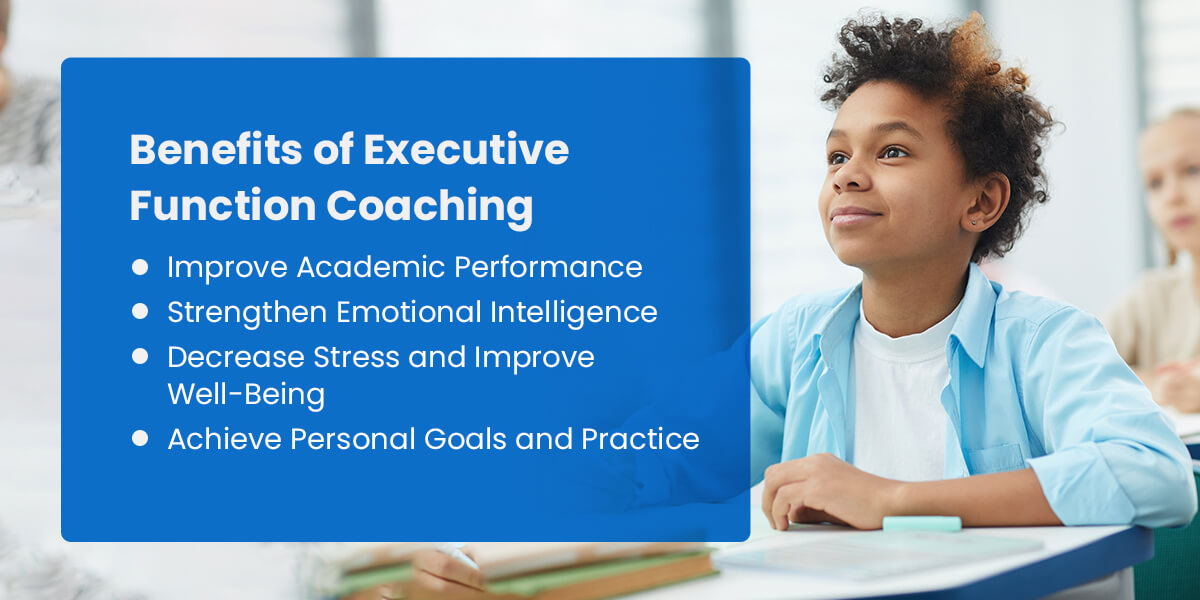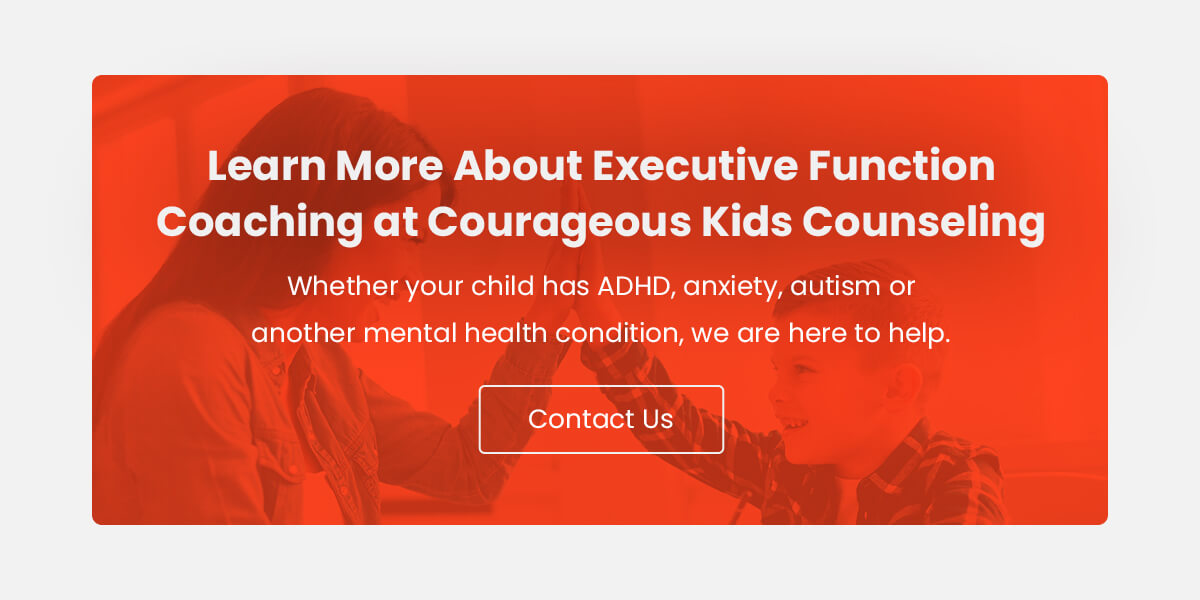Executive Functioning Coaching
Does your child struggle to concentrate, stay organized or remember to do homework? If so, they may have executive function challenges. Children with EF difficulties often have trouble completing school assignments or chores. They may also find it hard to deal with new problems or information, which can be a source of extreme stress and frustration.
The good news is that executive functioning coaching can help your child overcome these obstacles. Through counseling sessions and real-world practice, your child can improve their time management, study skills and any other executive function skill they may need help developing.
What Is Executive Functioning?
Executive function skills are the cognitive or mental abilities involved in managing our lives. In other words, these skills affect how we behave toward our goals and the mental capacities we need to accomplish them.
The term closely relates to self-regulation. In other words, executive functions are things we do to change our behavior. By effectively using your EF skills, you can actively improve your future.
We can measure executive function by the strength of these skills:
- Self-awareness
- Inhibition, also known as self-restraint
- Nonverbal working memory, or the ability to picture things mentally
- Verbal working memory, or “inner monologue”
- Emotional self-regulation, or the ability to use words, images and self-awareness to process and change how we feel about things
- Cognitive flexibility, or the ability to think outside the box
- Self-motivation
- Planning and problem-solving
When someone experiences issues with the above skills, they have executive dysfunction. You may have noticed these difficulties in your child, often manifesting as struggles with everyday tasks like chores or schoolwork.
While many people occasionally have trouble with executive function skills, those with attention deficit hyperactivity disorder can especially experience weakness in this area, as can children on the autism spectrum. That’s because people with these conditions have differences in the prefrontal cortex of the brain, which is the region that governs executive function skills.
Anxiety and executive function challenges also frequently co-occur. The connection might be because people with anxiety may have a decreased ability to ignore irrelevant information and more difficulty switching attention between tasks.
Executive Function Skills by Age
Your child develops executive functioning skills in their first two years of life. They begin to practice these skills through social play as they grow, often developing most rapidly from ages 3 to 5. From ages 5 to 12, they take on more executive function responsibilities at home and school.
As a parent, you help your child learn and practice these skills over time. For instance, you’ve likely already helped them establish routines, break big tasks into smaller chunks and encourage games and role-playing to promote imagination. By the time they are a teenager or young adult, they should have many experiences to shape their skills in these areas.
However, some children can experience difficulties using their executive functioning skills independently. That’s where executive coaching comes in.
What Does an Executive Function Coach Do?
Executive function coaching for kids can help your child develop and improve their everyday functioning abilities. Coaching services are much different from medically based therapeutic services, instead using counseling to help your child practice techniques in everyday situations.
Counselors can help address the underlying issues of executive dysfunction, including ADHD, anxiety and autism. They can diagnose these mental health issues and work with your child on steps to manage challenges.
While some clients use this service after receiving a diagnosis of ADHD or other conditions associated with EF difficulties, many have identified their difficulties as barriers to their ability to achieve goals.
Coaching services begin with a consultation, during which your child will speak with a coach to determine whether they are a good fit. They will typically meet with a psychologist once or twice a week to help them build goals and provide tips to overcome specific real-life challenges.
Benefits of Executive Function Coaching

If your child can’t stay organized, forgets appointments or homework and cannot complete more extensive projects, they may have EF difficulties and could benefit from executive functioning coaching.
Advantages of executive function coaching for children include the following.
Improve Academic Performance
Executive function coaching can help your child improve academic performance by working on time-management skills and prioritizing tasks. If your child has difficulties managing complex projects or frequently procrastinates, counselors can help them create specific goals and work toward achieving them. Coaching can help improve the symptoms of a dual diagnosis of executive function and ADHD.
As time progresses and your child gets better at applying tips to everyday challenges, the goals will also change as your child learns how to use executive function skills independently. They may see improvements in test-taking, completing homework and other academic pursuits.
Strengthen Emotional Intelligence
Counselors will encourage your child to talk about themselves and their challenges, thereby strengthening their mindfulness and emotional intelligence. Improving in these areas can significantly enhance their ability to avoid distraction and impulsive actions associated with EF difficulties. Since challenges with executive functioning and autism frequently co-occur, strengthening emotional intelligence can go a long way in helping clients with autism symptoms like poor impulse control.
Decrease Stress and Improve Well-Being
Executive functioning coaching can also help clients improve their overall well-being. Coaches emphasize the importance of good sleep and nutrition, which can help enhance EF skills. Encouraging flexible problem-solving in coaching sessions also fosters a growth mindset, which provides a foundation for your child’s success.
Many people benefit from an executive function coach for anxiety. For example, if an anxious student lacks the executive function skills to prioritize tasks, the confusion can increase their stress and anxiety about school or homework. Coaching is especially valuable to help them accomplish tasks and restore calming balance to life.
Achieve Personal Goals and Practice Passions
Executive function coaching can help your child strive toward personal goals. In coaching sessions, they’ll select real-world activities they love or are passionate about and apply techniques they learn in therapy to get better. Child counselors are flexible and patient and will work at your child’s preferred pace. Executive function coaching can be fun and engaging, allowing your child to participate in their passions and find various ways to improve their lives.
Learn More About Executive Function Coaching at Courageous Kids Counseling
Many children experience executive function difficulties, though coaching can help. At Courageous Kids Counseling, we can work with your child to overcome any EF-related challenges to ease their stress and promote better self-esteem and personal growth.
Whether your child has ADHD, anxiety, autism or another mental health condition, we are here to help. Learn how the licensed therapists at Courageous Kids Counseling can help your child develop or improve their executive function skills by contacting us today.
Want to know where to start?
In our work together, we will uncover what is missing from your child’s life, what’s holding them back in worry and despair, and what are the ways we can help them move toward a place of happiness and fulfillment.
We provide convenient in-person and online sessions.
Schedule An AppointmentContact Us

